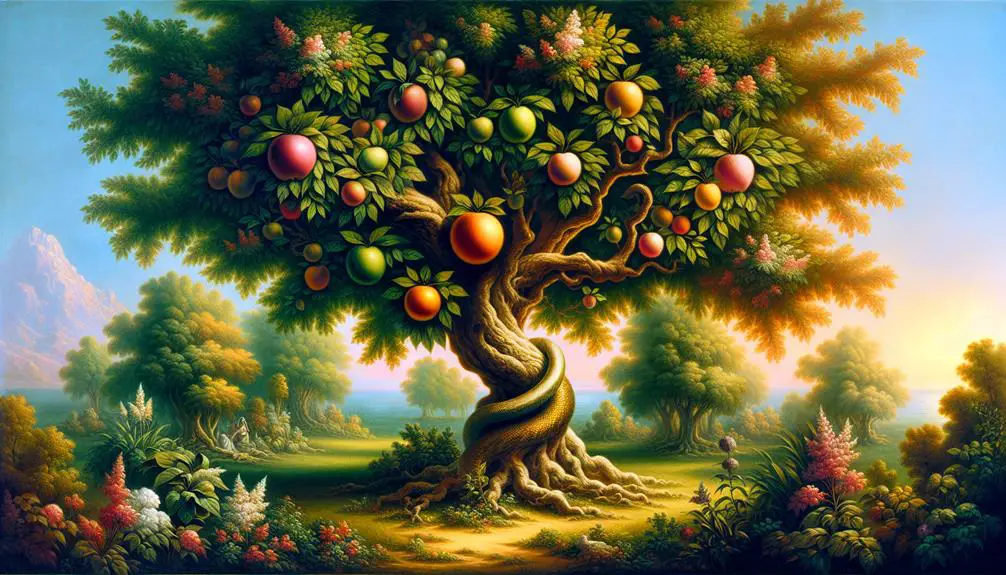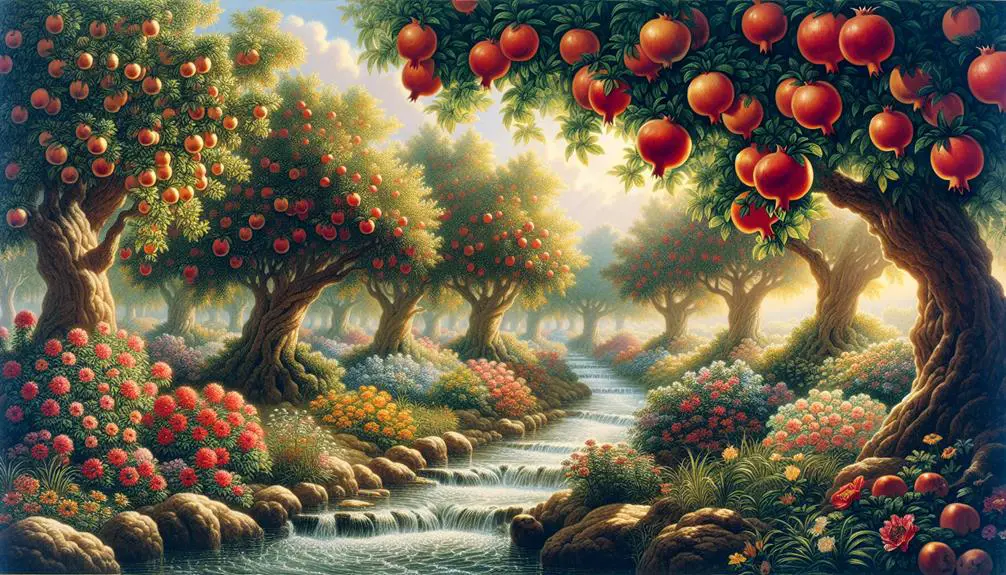Nourish your soul with the deep symbolism of fruits in the Bible, uncovering hidden meanings that transcend the stories.

Fruits in the Bible
Fascinatingly, fruits frequently feature in foundational Bible stories, symbolizing significant spiritual truths and teachings. You've likely heard of the forbidden fruit, a symbol of temptation and the fall of man, but that's just the beginning.
From the figs that facilitated an awakening in Adam and Eve to the grapes representing promise and prosperity in the Promised Land, each fruit carries a deeper meaning. Olives symbolize peace and anointing, while pomegranates are associated with life and fertility.
By exploring these symbolic fruits, you'll uncover layers of meaning in biblical narratives that may have previously seemed straightforward. Why do these fruits hold such power in these stories, and what might they reveal about the broader themes of the Bible? Let's find out.
Key Takeaways
- Fruits symbolize complex concepts like temptation, prosperity, and spiritual growth in biblical narratives.
- Specific fruits such as figs, grapes, olives, and pomegranates carry deep symbolic meanings tied to peace, promise, and fertility.
- The symbolism of fruits extends beyond their physical attributes, reflecting moral lessons, divine blessings, and spiritual enlightenment.
- Pomegranate's multifaceted symbolism in religious contexts underscores its significance in conveying prosperity, health, and divine favor.
The Forbidden Fruit

In analyzing the narrative of the Forbidden Fruit, it's critical to recognize its pivotal role in the context of biblical teachings and human history. This story, deeply embedded in the Book of Genesis, introduces the concept of original sin, a fundamental doctrine in Christian theology. You're delving into a tale that not only marks the inception of human moral consciousness but also sets the stage for the necessity of redemption and salvation.
The Forbidden Fruit, as described, stands as a symbol of the choice between obedience and disobedience, knowledge and ignorance. Your exploration into its symbolic interpretations reveals a rich tapestry of meanings that have evolved over centuries. It's not merely about the act of eating a fruit but about the awakening to moral dilemmas and the complexities of ethical decision-making. This narrative underscores the weight of choices and their consequences, which ripple through the annals of human history.
Original sin, as derived from this narrative, illustrates the inherent flawed nature of humanity. It's a concept that you'll find has shaped the core of Christian theological discourse, emphasizing the human condition's imperfection and the perpetual struggle between good and evil. Your understanding of this story enriches your grasp of human vulnerability and the perpetual quest for moral integrity.
Furthermore, the Forbidden Fruit's symbolic interpretations extend beyond the confines of religious doctrine, influencing cultural and philosophical thoughts. It serves as a metaphor for the universal human experience of temptation, the pursuit of forbidden knowledge, and the inevitable encounter with the consequences of one's actions. This narrative, therefore, isn't just a relic of religious teaching but a mirror reflecting the eternal human struggle with morality, choice, and consequence.
Figs and Spiritual Awakening

Exploring the symbolic significance of figs reveals their deep connection to spiritual awakening and enlightenment within biblical texts. Figs, often mentioned in the context of Biblical diets, serve not only as sustenance but also as profound symbols of spiritual growth and the search for deeper understanding. The fig tree itself becomes a metaphor for Israel and the individual's journey towards spiritual enlightenment.
Fig symbolism in the Bible can be broken down into three key aspects:
- A Symbol of Peace and Prosperity: The fig tree, with its abundant fruit, symbolizes a state of peace and spiritual prosperity. It represents a time when you're in harmony with your spiritual beliefs, leading to a state of inner peace and fulfillment.
- Knowledge and Spiritual Nourishment: Just as figs were a part of Biblical diets, providing physical nourishment, they also symbolize spiritual food. Engaging with fig symbolism encourages you to seek knowledge and wisdom, essential components of spiritual awakening.
- Restoration and Healing: The fig tree is often associated with restoration and healing. It stands as a symbol for the healing of the spirit and the mending of the relationship between humanity and the divine. This aspect emphasizes the fig's role in spiritual renewal and the journey towards enlightenment.
Through these lenses, figs in the Bible transcend their role as mere food, embodying lessons on spiritual awakening and the continuous quest for a deeper connection with the divine. As you delve into Biblical stories and parables, the fig emerges not just as a fruit but as a guide towards spiritual enlightenment and understanding.
Grapes: Promise and Prosperity

Grapes, symbolizing both promise and prosperity, have long been integral to biblical narratives, reflecting a rich tapestry of spiritual and material abundance. This fruit's significance is deeply woven into the fabric of sacred texts, often serving as a metaphor for God's bounty and the fulfillment of divine promise. You'll find that wine symbolism, in particular, occupies a central place in biblical literature, representing joy, celebration, and the blessings of God.
Delving deeper, the vineyard parables provide a fascinating lens through which to explore themes of moral and spiritual growth, judgment, and redemption. These stories use the cultivation of grapes as a powerful allegory for God's relationship with His people, underscoring the care and attention required to produce fruit, both in the vineyard and in one's life. The expectation set forth in these parables is clear: just as a vineyard's keeper anticipates a harvest of grapes, so too does God expect His people to yield goodness and righteousness.
Moreover, the recurring motif of grapes and wine across the Old and New Testaments encapsulates a promise of prosperity and communal well-being. It's noteworthy that in times of peace and prosperity, wine flows abundantly, symbolizing God's provision and care. Conversely, the absence or destruction of vineyards serves as a stark warning of divine displeasure and impending judgment.
In essence, grapes and the wine produced from them are emblematic of both physical sustenance and spiritual nourishment, encapsulating themes of promise, prosperity, judgment, and redemption. Through the lens of wine symbolism and vineyard parables, the Bible invites you into a deeper understanding of God's desires and expectations for humanity.
Olives: Peace and Anointing

Just as grapes signify promise and prosperity in biblical narratives, olives embody themes of peace and anointing, holding a profound place in sacred texts. The olive branch has become a universal symbol of peace, and the act of anointing with olive oil represents purification and consecration, deeply rooted in ancient traditions and beliefs.
Olive cultivation and the rituals surrounding its harvest are imbued with spiritual significance. The process of growing, tending, and harvesting olives isn't just an agricultural activity but a sacred duty, reflecting a deep connection between the people and the land. This connection is evident in the careful attention given to:
- The Timing of Harvest: Olives are typically harvested from late autumn to early winter. This period is chosen not only for its practical benefits in maximizing oil yield but also reflects a spiritual timing, aligning with cycles of renewal and preparation for the coming seasons.
- The Method of Collection: Traditionally, olives are handpicked or gently shaken from the trees onto nets below. This method ensures the fruit's integrity, symbolizing a respectful and peaceful approach to harnessing nature's bounty.
- The Pressing Process: The pressing of olives to extract oil is a metaphor for the transformation process—turning something raw into a substance of great value and significance. This extracted oil, used in anointing, signifies the elevation of the ordinary to the sacred, marking individuals and objects as chosen and holy.
Pomegranates: Life and Fertility

In biblical narratives, pomegranates symbolize life and fertility, reflecting their deep-seated presence in ancient texts as emblems of abundance and blessing. This fruit's significance isn't merely coincidental; its myriad seeds represent potential for prolific reproduction, mirroring the ancient world's appreciation for fertility in both land and life. Pomegranate symbolism extends beyond mere sustenance, embodying promises of prosperity and the continuation of lineage.
Delving deeper, you'll find that pomegranates weren't only consumed but also featured prominently in religious rituals and temple decorations. Their image was engraved on the pillars of Solomon's Temple, a testament to their revered status. This integration of pomegranate motifs into sacred spaces underscores their symbolic weight in conveying blessings and divine favor.
Ancient uses of pomegranates were multifaceted, encompassing dietary, medicinal, and spiritual realms. They were a staple in the diet, valued for their health benefits and refreshing taste. Medicinally, various parts of the pomegranate tree and fruit were used to treat ailments, from digestive issues to skin conditions, showcasing an early understanding of their beneficial properties.
This analysis reveals the layers of meaning behind pomegranate symbolism in biblical texts. It wasn't just their physical attributes that made them stand out but their capacity to represent deeper spiritual truths. The pomegranate's enduring presence in these ancient narratives invites you to appreciate its rich symbolism and the wisdom of those who held it in high regard.
Frequently Asked Questions
What Role Do Dates Play in Biblical Narratives, and How Were They Symbolically Understood by Ancient Cultures?**
In exploring the significance of dates, you'll find they were central to ancient cultures, both in practical terms through date cultivation and in symbolic meanings. Dates represented fertility and prosperity, deeply interwoven with the life and rituals of these societies.
Their role in narratives often highlighted themes of survival, sustenance, and divine blessings, reflecting their esteemed status. Date symbolism in these contexts underscores their value beyond mere nutrition, embodying hope and abundance.
How Does the Bible Address the Consumption of Citrus Fruits, and What Significance, if Any, Do They Have in Biblical Stories?**
You're delving into a topic where citrus cultivation intertwines with ancient narratives. While the Bible doesn't explicitly detail citrus fruits, their absence from direct mention doesn't diminish their historical or health symbolism significance.
In What Context Are Almonds Mentioned in the Bible, and What Do They Represent in the Broader Spiritual or Cultural Landscape of the Time?**
Almonds in the Bible symbolize watchfulness and promise, reflecting deeper cultural interpretations of the time. They're mentioned notably in Aaron's rod that budded in Numbers 17, symbolizing God's chosen leadership. This story, among others, showcases almond symbolism as a sign of divine approval and vigilance.
You'll see that almonds aren't just food; they carry a rich spiritual significance, embodying themes of hope and divine watchfulness in the biblical narrative.
Are There References to Berries in the Bible, and How Were They Perceived or Utilized by Biblical Figures?**
You're diving into a world where berries aren't just food; they're a glimpse into ancient practices and beliefs.
The Bible doesn't explicitly mention berries, but it's the silence that speaks volumes. This absence makes you ponder berry cultivation techniques and berry-based medicines of the time, challenging you to read between the lines.
Analyzing this void, you uncover a scholarly perspective on how biblical figures might've utilized these natural resources, enriching your understanding of historical contexts.
What Is the Significance of the Mustard Seed in Biblical Teachings, and How Does It Compare to the Symbolic Meanings of Fruits Mentioned in the Scriptures?**
You're exploring the mustard seed's biblical significance, particularly its symbol of faith growth. Unlike other scriptural symbols, this seed stands out for its metaphorical representation of faith's potential.
Through agricultural metaphors, it teaches that even the smallest faith can expand immensely. This contrasts with fruits' symbolic meanings, often related to prosperity or temptation.
Your analysis reveals a unique perspective on biblical teachings, emphasizing the transformative power of faith.
Conclusion
In conclusion, the Bible's fruit basket is more than a divine grocery list; it's a vibrant tableau of spiritual metaphors and divine comedy. Imagine the forbidden fruit as nature's first 'forbidden snack,' teasing humanity with the ultimate celestial 'do not eat' label.
Figs stir the soul awake like spiritual espresso shots, while grapes dangle promises of a boozy paradise. Olives anoint with peace like slick diplomats, and pomegranates burst with seeds of life, insisting on fertility with the persistence of an overbearing mother-in-law.
Through this satirical orchard, the Bible serves both spiritual sustenance and a feast of wisdom, seasoned with a hint of divine humor.



Sign up